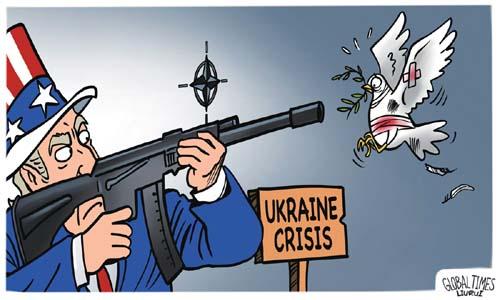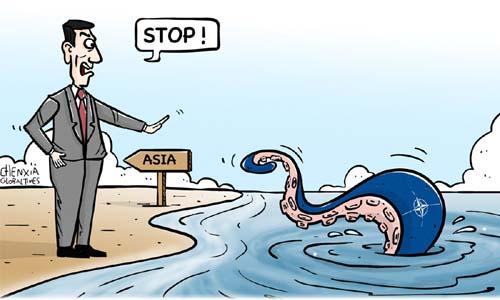
NATO’s proxy war highlights urgent need for a multipolar future
Carlos Martinez
A year ago, Chinese President Xi Jinping and Russian President Vladimir Putin met in Beijing at start of the Winter Olympics, issuing a joint statement that called on the West to abandon the ideologized approaches of the Cold War. The statement expressed their shared opposition to the further expansion of NATO and emphasized the need for long-term legally binding security guarantees in Europe.
President Xi said the two sides have taken an active part in the reform and development of the global governance system, followed true multilateralism. A year later, with NATO’s horrifying proxy war against Russia dragging on, the people of the world are living, and dying, with the consequences of the US and its allies’ stubborn refusal to join the path of multipolarity.
With the benefit of hindsight, the Ukraine crisis has acquired a certain tragic inevitability. Russia had made its red lines perfectly clear over the course of many years: that Ukraine must never become part of NATO; that NATO’s expansion must end; that Ukraine must never be allowed to be used as a launching pad for war on Russia; and that the national rights of the Russian-speaking peoples of eastern Ukraine must be respected.

As John Wojcik wrote in the left-wing US journal People’s World in January 2022, what happens in Ukraine is of critical importance to the survival of Russia. “From Napoleon to the Kaiser to Hitler, Russia has been invaded too many times from Europe, and it is understandably determined to maintain a militarily non-aligned buffer zone on its border.”
It was within the West’s power to prevent the current war, and it remains within the West’s power to put a stop to it now. Unfortunately the leading Western power, the US, has only a marginal interest in helping to bring about peace in Europe. If the US wanted peace, it could have supported Ukraine in adopting a path of military neutrality and building friendly and mutually-beneficial relations with both East and West. But the US prioritizes hegemony over peace, and has therefore constantly meddled in Ukraine with a view to exploiting its people and geography to project imperial power against Russia.
Guardian journalist Martin Kettle said the quiet part out loud recently, observing that “sending tanks to Ukraine makes one thing clear: this is now a western war against Russia.” The West is pursuing a policy of gradual, continuous escalation in Ukraine – recycling a strategy that it used against the Soviets in Afghanistan four decades ago. Its end-game is to significantly weaken Russia, cripple the Russian economy, undermine public support for the Putin government, and fertilize the ground for the emergence of a new government in Moscow willing to follow Washington’s instructions.
Such a policy is not pursued out of any specific hatred of Russia, but as part of a broader global campaign to assert US hegemony and break the trajectory toward a multipolar system of international relations. At the same time as attacking Russia, the US is also escalating its long-term campaign to contain and encircle China.
NATO Secretary General Jens Stoltenberg stated in a recent visit to South Korea that “China poses a challenge to our values, to our interests and to our security.” One has to wonder whether by “our values and interests” he means hegemony, warmongering, plutocracy, profiteering, and domination of the world’s land, resources and markets.
These desperate attempts to roll back the multipolar process are not destined to bear fruit. Even among the countries of Western Europe – with which the US shares a political ideology, a set of cultural values and an enduring commitment to white supremacy – there is diminishing enthusiasm for a reckless new Cold War, which is already contributing to serious economic difficulties in Britain, Germany and elsewhere. German Chancellor Olaf Scholz has reluctantly agreed to allow German Leopard 2 tanks to be delivered to Ukraine, but only after sustained pressure.
In the Global South, such pressure has increasingly little impact. Soon after capitulating on the tanks issue, Scholz travelled to Brazil to visit the newly-inaugurated President Luiz Inácio Lula da Silva. Asked whether Brazil would provide weapons to Ukraine, Lula stated firmly that “our war is against poverty, not Russia.”
Lula made an important suggestion: that China, Brazil, India and Indonesia – “a club of countries that want to build peace on the planet” – could take the lead in mediating a diplomatic solution to the Ukraine conflict. He added that “our friends the Chinese play a very important role.”
The idea of China and other responsible countries of the Global South taking a lead on mediation is gaining traction. Professor Jeffrey Sachs recently wrote an article in the Economist that “neutral nations including Argentina, Brazil, China, India, Indonesia and South Africa” could have an important role in facilitating a negotiated end to the conflict and becoming “the co-guarantors to begin a new era of peace and rebuilding.”
People who have critical thinking skills recognize that the US and NATO are incapable of, and unwilling to, clear up the mess they created. Herein lies the profound irony. The US is waging war on multipolarity, but a major effect of this war is to highlight to the peoples of the world the indispensable and urgent need for a multipolar future.
The writer is a British author and independent political commentator
